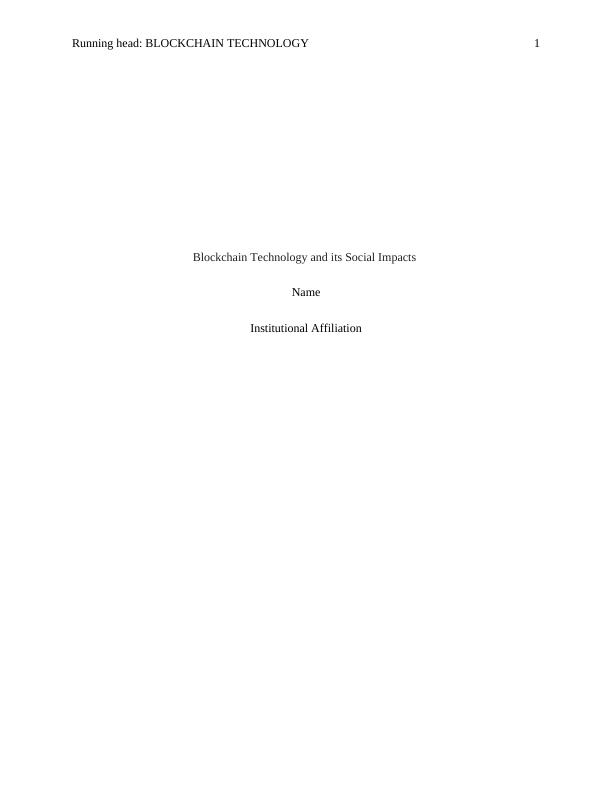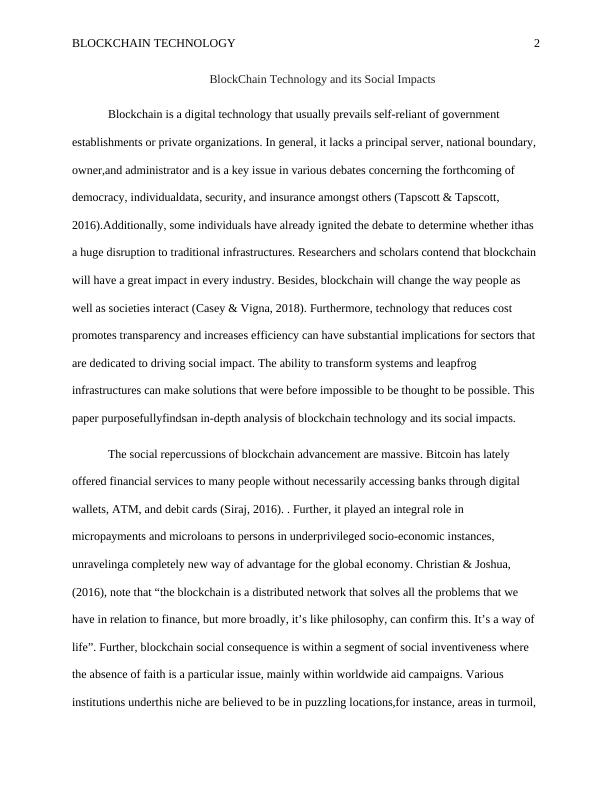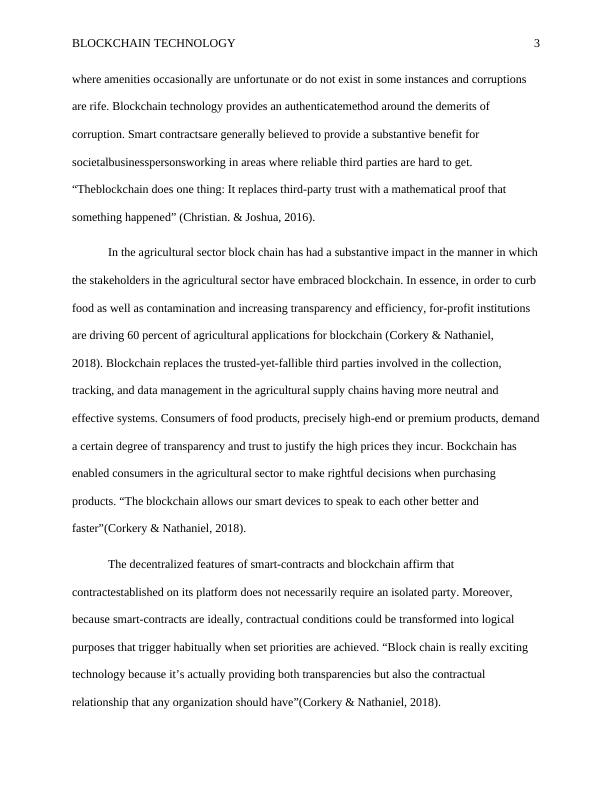Blockchain Technology and its Social Impacts
6 Pages1479 Words436 Views
Added on 2023-04-22
About This Document
An in-depth analysis of blockchain technology and its social impacts. The paper discusses the impact of blockchain technology on various sectors such as agriculture, finance, and democracy.
Blockchain Technology and its Social Impacts
Added on 2023-04-22
ShareRelated Documents
Running head: BLOCKCHAIN TECHNOLOGY 1
Blockchain Technology and its Social Impacts
Name
Institutional Affiliation
Blockchain Technology and its Social Impacts
Name
Institutional Affiliation

BLOCKCHAIN TECHNOLOGY 2
BlockChain Technology and its Social Impacts
Blockchain is a digital technology that usually prevails self-reliant of government
establishments or private organizations. In general, it lacks a principal server, national boundary,
owner,and administrator and is a key issue in various debates concerning the forthcoming of
democracy, individualdata, security, and insurance amongst others (Tapscott & Tapscott,
2016).Additionally, some individuals have already ignited the debate to determine whether ithas
a huge disruption to traditional infrastructures. Researchers and scholars contend that blockchain
will have a great impact in every industry. Besides, blockchain will change the way people as
well as societies interact (Casey & Vigna, 2018). Furthermore, technology that reduces cost
promotes transparency and increases efficiency can have substantial implications for sectors that
are dedicated to driving social impact. The ability to transform systems and leapfrog
infrastructures can make solutions that were before impossible to be thought to be possible. This
paper purposefullyfindsan in-depth analysis of blockchain technology and its social impacts.
The social repercussions of blockchain advancement are massive. Bitcoin has lately
offered financial services to many people without necessarily accessing banks through digital
wallets, ATM, and debit cards (Siraj, 2016). . Further, it played an integral role in
micropayments and microloans to persons in underprivileged socio-economic instances,
unravelinga completely new way of advantage for the global economy. Christian & Joshua,
(2016), note that “the blockchain is a distributed network that solves all the problems that we
have in relation to finance, but more broadly, it’s like philosophy, can confirm this. It’s a way of
life”. Further, blockchain social consequence is within a segment of social inventiveness where
the absence of faith is a particular issue, mainly within worldwide aid campaigns. Various
institutions underthis niche are believed to be in puzzling locations,for instance, areas in turmoil,
BlockChain Technology and its Social Impacts
Blockchain is a digital technology that usually prevails self-reliant of government
establishments or private organizations. In general, it lacks a principal server, national boundary,
owner,and administrator and is a key issue in various debates concerning the forthcoming of
democracy, individualdata, security, and insurance amongst others (Tapscott & Tapscott,
2016).Additionally, some individuals have already ignited the debate to determine whether ithas
a huge disruption to traditional infrastructures. Researchers and scholars contend that blockchain
will have a great impact in every industry. Besides, blockchain will change the way people as
well as societies interact (Casey & Vigna, 2018). Furthermore, technology that reduces cost
promotes transparency and increases efficiency can have substantial implications for sectors that
are dedicated to driving social impact. The ability to transform systems and leapfrog
infrastructures can make solutions that were before impossible to be thought to be possible. This
paper purposefullyfindsan in-depth analysis of blockchain technology and its social impacts.
The social repercussions of blockchain advancement are massive. Bitcoin has lately
offered financial services to many people without necessarily accessing banks through digital
wallets, ATM, and debit cards (Siraj, 2016). . Further, it played an integral role in
micropayments and microloans to persons in underprivileged socio-economic instances,
unravelinga completely new way of advantage for the global economy. Christian & Joshua,
(2016), note that “the blockchain is a distributed network that solves all the problems that we
have in relation to finance, but more broadly, it’s like philosophy, can confirm this. It’s a way of
life”. Further, blockchain social consequence is within a segment of social inventiveness where
the absence of faith is a particular issue, mainly within worldwide aid campaigns. Various
institutions underthis niche are believed to be in puzzling locations,for instance, areas in turmoil,

BLOCKCHAIN TECHNOLOGY 3
where amenities occasionally are unfortunate or do not exist in some instances and corruptions
are rife. Blockchain technology provides an authenticatemethod around the demerits of
corruption. Smart contractsare generally believed to provide a substantive benefit for
societalbusinesspersonsworking in areas where reliable third parties are hard to get.
“Theblockchain does one thing: It replaces third-party trust with a mathematical proof that
something happened” (Christian. & Joshua, 2016).
In the agricultural sector block chain has had a substantive impact in the manner in which
the stakeholders in the agricultural sector have embraced blockchain. In essence, in order to curb
food as well as contamination and increasing transparency and efficiency, for-profit institutions
are driving 60 percent of agricultural applications for blockchain (Corkery & Nathaniel,
2018). Blockchain replaces the trusted-yet-fallible third parties involved in the collection,
tracking, and data management in the agricultural supply chains having more neutral and
effective systems. Consumers of food products, precisely high-end or premium products, demand
a certain degree of transparency and trust to justify the high prices they incur. Bockchain has
enabled consumers in the agricultural sector to make rightful decisions when purchasing
products. “The blockchain allows our smart devices to speak to each other better and
faster”(Corkery & Nathaniel, 2018).
The decentralized features of smart-contracts and blockchain affirm that
contractestablished on its platform does not necessarily require an isolated party. Moreover,
because smart-contracts are ideally, contractual conditions could be transformed into logical
purposes that trigger habitually when set priorities are achieved. “Block chain is really exciting
technology because it’s actually providing both transparencies but also the contractual
relationship that any organization should have”(Corkery & Nathaniel, 2018).
where amenities occasionally are unfortunate or do not exist in some instances and corruptions
are rife. Blockchain technology provides an authenticatemethod around the demerits of
corruption. Smart contractsare generally believed to provide a substantive benefit for
societalbusinesspersonsworking in areas where reliable third parties are hard to get.
“Theblockchain does one thing: It replaces third-party trust with a mathematical proof that
something happened” (Christian. & Joshua, 2016).
In the agricultural sector block chain has had a substantive impact in the manner in which
the stakeholders in the agricultural sector have embraced blockchain. In essence, in order to curb
food as well as contamination and increasing transparency and efficiency, for-profit institutions
are driving 60 percent of agricultural applications for blockchain (Corkery & Nathaniel,
2018). Blockchain replaces the trusted-yet-fallible third parties involved in the collection,
tracking, and data management in the agricultural supply chains having more neutral and
effective systems. Consumers of food products, precisely high-end or premium products, demand
a certain degree of transparency and trust to justify the high prices they incur. Bockchain has
enabled consumers in the agricultural sector to make rightful decisions when purchasing
products. “The blockchain allows our smart devices to speak to each other better and
faster”(Corkery & Nathaniel, 2018).
The decentralized features of smart-contracts and blockchain affirm that
contractestablished on its platform does not necessarily require an isolated party. Moreover,
because smart-contracts are ideally, contractual conditions could be transformed into logical
purposes that trigger habitually when set priorities are achieved. “Block chain is really exciting
technology because it’s actually providing both transparencies but also the contractual
relationship that any organization should have”(Corkery & Nathaniel, 2018).

End of preview
Want to access all the pages? Upload your documents or become a member.
